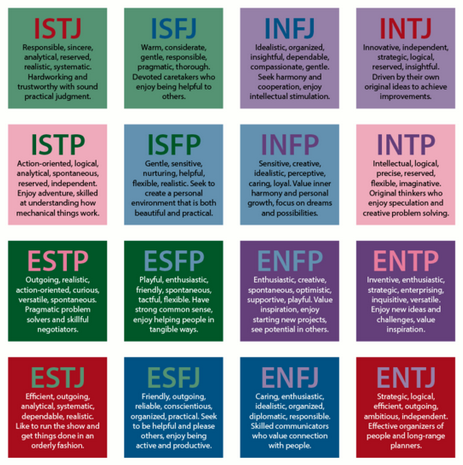Discovering my Myers-Briggs personality type back in 2010 or so rocked my world. I’d only vaguely heard about the MBTI before, and took the assessment as an exercise during a leadership course through work. Learning about my personality type and how it affects things like how I take in information and stimulus, how I interact with the world and others, and seeing it in the context of how it affects my behaviours, was a lightning bolt of insight that has had long-lasting effects for me. It was one of the first times I had a clear and deep insight into the mystery that is me, and I have used it to great success in understanding my relationships with others, and how their personality types govern their behaviours as well. Having grown so appreciative of knowing my MBTI, it was a shock of recognition to see the same deep understandings into my life possible through tarot cards.
Are you familiar with the Myers-Briggs Type Indicator (MBTI)? It’s rooted in Carl Jung’s theory of personality as expounded in his book Personality Types. Jung believed that we are governed by four primary cognitive functions: thinking, feeling, sensation, and intuition. Each of these manifests itself in one of two orientations, either extraverted or introverted, yielding a total of eight “dominant” functions. Elaborating upon Jung’s work in subsequent decades, Katharine Cook Briggs and her daughter Isabel Myers refined the theory by adding two secondary personality types, “judging” and “perception”, which also take extra- or introverted forms. These two extra elements, in combination with the others previously mentioned, yield a possible of 16 personality “types,” each of which is represented by a four-letter abbreviation. (Source)
Myself, I am an ENFP, the most introverted of the extroverts. Reading the characteristics common to other ENFPs was a huge series of “aha!” moments for me. So many things about me crystallized into cognizance when I started looking into it: how I am happiest on my own in a crowd, how I think through any situation by speaking to others about it, how I love to interact with other humans but find it exhausting, how I am driven to find connections and meaning in the chaos of human experience. (Hello, tarot cards!) So while I’m far from an MBTI expert, I certainly am grateful for the insight into my own personality that I’ve received through the lens of MBTI.
I’d only scratched the surface of learning about tarot when I started seeing the parallels between MBTI and tarot. Both are deeply connected to Jungian psychology, with ideas of archetypes and the collective unconscious. Both use an external tool to help you elicit, categorize, and make sense of patterns and behaviours that are already ingrained within you. Neither tells you something that isn’t already there. Both can be used to help you understand your own motivations from an objective perspective. Both are adored and reviled by opposing camps. 😉
The four suits of tarot are each representative of an element, and can be linked directly to the four Jungian primary functions of MBTI as follows:
Wands -> Fire -> Intuition
Cups -> Water -> Feeling
Swords -> Air -> Thinking
Pentacles -> Earth -> Sensation
Further, in tarot the “court” cards are the Page, Knight, Queen and King of each suit, and are often seen as representative of people or personalities in our lives (as opposed to the major arcana, which are archetypal experiences, and the minor arcana pip cards, which cover, in the words of Rachel Pollack, “aspects of life as people actually live it.”) So we have 16 court cards and 16 MBTI personality types, each combining various levels of the four primary functions / elements. While I see this as too much of a coincidence to be an accident, I am not quite proficient enough in either MBTI or tarot to ascribe a court card to each personality type, but this blogger seems to have taken a good run at it. I’m not sure I’m 100% on board with his interpretations, but I think I’ll need a little more experience in both tarot and MBTI to figure out how to ascribe the dominant and auxiliary functions correctly to more perfectly match up the court cards and personality types.
I definitely see myself doing more research into MBTI and tarot – there are just so many linkages. How about you? Are you a fan of MBTI or tarot or both, and have you noticed the strange congruence of personality types, suits, elements, and court cards? What has your experience been?

